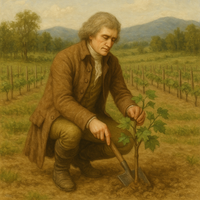Thomas Jefferson: The Founding Father of American Wine
Posted by Matteo Lahm on 30th Jun 2025
As we prepare to gather around the grill and crack open celebratory brews this July 4th, let’s raise a glass to an often-overlooked facet of American history: Thomas Jefferson’s pioneering influence on U.S. viticulture. A man known for his role in crafting our nation’s founding documents, Jefferson was equally passionate about planting the seeds of a domestic wine industry—imbuing a legacy that continues to flourish centuries later.
A Vision of American Wine
During his tenure as Minister to France in the 1780s, Jefferson became enamored with French wines. He meticulously recorded his favorites—Margaux, Lafite, Haut-Brion—and established direct relationships with French vintners. His ambition was simple: he believed the newly independent United States could rival Europe in producing world-class wines.
The Virginia Wine Company
Upon returning to Virginia, Jefferson saw fertile ground for his vision. He collaborated with Italian horticulturist Philip Mazzei—in fact, he convinced Mazzei to plant vines on Jefferson’s Albemarle County land and became a founding member of the Virginia Wine Company, a bold effort backed by prominent Virginians including George Washington. Although frost claimed many of their European grape plantings, Mazzei still managed to produce two barrels of wine from native grapes—an impressive early result.
Experiments at Monticello
At Monticello, Jefferson conducted numerous vine trials. In 1807, he planted 287 vines across 17 terraces with 24 European varieties—a lavish experiment in agricultural innovation. While most attempts failed, Jefferson soon pivoted to native grapes like fox grapes (Vitis labrusca) and scuppernongs (Vitis rotundifolia), demonstrating his adaptability. Though definitive evidence of wine-making during his lifetime is debated, his efforts sparked interest in American viticulture.
Seeds Take Root in Virginia
Jefferson’s vision planted more than vineyards—it nurtured an idea. As late as the 1970s, Virginia’s wine industry resurged, adopting European vinifera and French hybrids—just the kinds of grapes Jefferson had championed. Today, Virginia features over 300 wineries on more than 4,000 acres, with Monticello designated as a recognized AVA celebrating its historic roots.
Modern-Day Legacy
Jefferson's name resonates through the modern wine scene. In Charlottesville, Jefferson Vineyards stands as a testament to his dream—an estate rooted in Monticello's soil that now produces award-winning viognier and Bordeaux-style reds. The Thomas Jefferson Foundation has even acquired the vineyard, cementing the ties between his historic experiment and contemporary viticulture.
Charlottesville’s Monticello AVA earned “Wine Region of the Year” in 2023 from Wine Enthusiast, a milestone Jefferson would undoubtedly appreciate. His trust in American terroir and tireless advocacy laid groundwork for Virginia’s revival and the broader new‑world wine movement.

